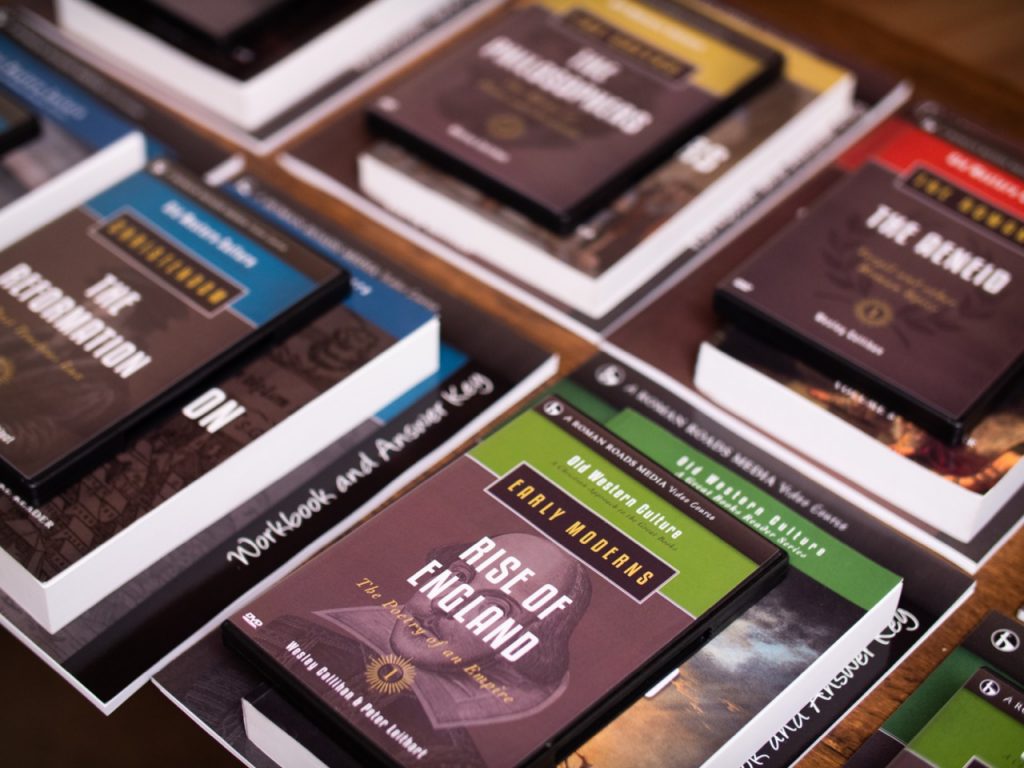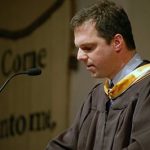Old Western Culture
What is it?
For centuries, the study of the great books has been central to education. Old Western Culture is your guide through the great books.
Old Western Culture is a robust great-books, dual-credit honors-level curriculum, but it is first and foremost storytelling. Learn, appreciate, and inherit “old Western culture” as C.S. Lewis coined the term.
Honors Track (default schedule) or Essentials Track available.


Watch
Watch a video lecture of summary, context, commentary, analysis, and inter-disciplinary connections of the great books.
Read
Read the texts of the great books themselves, using the Old Western Culture Readers, digital versions that come with the course, or the editions in your own library.


Engage
Answer the questions in the student workbook on your own or use them as discussion questions in a group.
Old Western Culture Readers
This sixteen-volume great books reader series was developed as a companion to the Old Western Culture great books curriculum, but also stands on its own.
Available in paperback and hardback (NEW!)

Try Old Western Culture | Lectures and Materials
Receive the first three lectures from Old Western Culture, as well as a sample workbook, Reader, Exam Pack, and other introductory material. Sign up below:
WHAT’S INCLUDED?
Each year of Old Western Culture is made up of three main parts, along with extra materials included as downloads.
1. The video course (included dedicated iOS and Android app)
2. The workbook.
3. The Readers (primary sources).
Extras: Exams, and other resources by unit.
For each category there is a choice to upgrade to physical components (DVD or DVD + Streaming for the video, and physical vs PDF for the workbooks and readers). All streaming and downloadable products are “forever streaming.” They do not expire! A NEW dedicated app allows downloading for offline use.

Explore By the Year
-
Old Western Culture: The GreeksPrice range: $299.00 through $583.00
-
Old Western Culture: The RomansPrice range: $299.00 through $583.00
-
Old Western Culture: ChristendomPrice range: $299.00 through $583.00
-
Old Western Culture: Early ModernsPrice range: $299.00 through $583.00
REVIEWS AND AWARDS
But what if there was a single program that adequately covered key texts of Western literature; that was well-written, accurate, and Christ-centered; and that didn’t just mimic all the other courses? Well, there is. Old Western Culture: A Christian Approach to the Great Books is everything other Classical-style courses wish they were.
Caleb Crossman, Exodus Books
World class teaching by classical educator Wesley Callihan. Demanding, challenging, mesmerizing content that will leave your student, no matter how steeped in history and classical studies, begging for more.
– Lisa Nehring, Golden Grasses
This has to be the best curriculum we have found for studying the great classics! We’ve been homeschooling for about 15 years and have not found anything like this. Mr. Callihan is knowledgeable, engaging, and entertaining. He speaks to the students as if he is right there with them. Not only have they chosen excellent books but all the information that he shares with the student makes this a perfect Literature and Social Studies course. On top of that, they have included a booklet with some of the most beautiful artwork to accompany the course. It’s like walking through a museum. Frequently, my son shares a story at the dinner table about what Mr. Callihan said. We all get to enjoy his stories. It also lets me know he’s “getting it.” I would highly recommend this to any family interested in a Classical Christian education. You will not be disappointed with Old Western Culture or Roman Roads Media.
– Stephanie White, Homeschool mom
The Greeks is taught by Wes Callihan, quite possibly the most engaging teacher of classical material I have encountered since my days at the University of St. Thomas. It is obvious that he loves what he is teaching, which is the mark of a truly great teacher. When he talks about Achilles and Agamemnon, you know that he feels their conflict and their emotions. You never have any doubt that he is going to lead you safely through the turmoil of Achilles’ last days. He teaches with confidence and enthusiasm, and it is infectious. If you want your child to have a Great Books, classical education – either the kind you had or the kind you wish you had – Wes Callihan is the man to teach her.
Laura, Homeschool mom
Wes Callihan is an incredible mentor. His style is that of an armchair story teller. Instead of breaking down the technical nuances of a text (and the Vandiver Great Courses Company Course on The Iliad does that beautifully), he invites us into his personal library, shows us his well-worn Lattimore text and then proceeds to tell us stories. Friends have asked if the reading load in these courses will dominate their high school student’s reading time and leave no room for other goodness. As a former high school teacher, I confess to being impressed by the layout of the course and the breakdown of the work.
Sara Masarik, Plumfield and Paideia
It is a program my kids have loved the most this year. And I love that I am able to learn alongside then too. After many years of misunderstanding some of The Great Books, I can safely say I am closer to realizing what they mean now. I am truly amazed by this program!
Amy Fleeker, Homeschool mom
Callihan is a gifted teacher—so much so that I think parents might want to watch the lectures along with their students for their own enlightenment.
Cathy Duffy, 102 Top Picks for Homeschool Curriculum
I really like the idea of a classical education for my children. I was considering Omnibus by VP but was very intimidated by teaching that myself and their online classes were so expensive. When I found this DVD series I felt like this was exactly what I was looking for! My ninth grader and I sit and watch Wesley Callihan talk to us from his study chair. He really makes the Greek Classics accessible to us. I also love that he comes to the classics from a Christian world view. This series fits the bill for a classical education!
R. Andrews, Homeschool dad
As a homeschool mom just venturing into classical education, I can tell you that Old Western Culture: The Greeks is super-easy to use. With schedules carefully laid out for you, you can easily plug and play. I like that all preparation is done for me and I need simply to enjoy listening to my children as they begin to think and talk and discuss ideology together.
Lynn, Homeschool mom
I’ve tried a lot of “great books” materials in the past. All have left me feeling inadequate and incapable. All of them. Old Western Culture though? This one is different.
Debra Brinkman, Footprints in the Butter
Experience the Curriculum
Excerpts and Free Lectures
Preview excerpts as well as full lectures from Old Western Culture. This is a playlist, so feel free to navigate forward, or watch it on YouTube.
What’s Included?
A little overview of the components included in Old Western Culture
OLD WESTERN CULTURE BY THE UNIT
YEAR ONE: THE GREEKS
Unit 1: The Epics
The Epics covers the two great poems of Homer: The Iliad and the Odyssey. Join Wesley Callihan, a veteran teacher of the classics, as he guides the student through the world of Homer. In story-like fashion, he steers the reader through the plot, poetic devices, background, philosophy, history, and beauty of the poems, as well as how we should approach these monuments of Western culture from a Christian perspective.
Unit 2: Drama and Lyrics
Drama and Lyric covers the beginning of drama and some of the earliest comedies and tragedies known to the Western world. This course includes lectures on the three primary tragedians from the Ancient Greek world by Sophocles, Aeschylus, and Euripides and also one of the most famous writers of Greek comedy, Aristophanes. The course also offers an introduction to Greek lyric poetry from the same era, including passages by Pindar, Sappho, and Quintus of Smyrna. A lecture on the minor epic poetry of Hesiod is also included as a complement to part Greeks: The Epics.
Unit 3: The Histories
The Histories introduces students to three of history’s most influential early historians. Students will learn about Herodotus, the “Father of History”, as they read his masterpiece, The Histories, and its inquiries into the origins of the Greco-Persian Wars. They will read and learn about Thucydides’ History of the Peloponnesian War and its forays into the earliest expressions of political philosophy. And last they will read Xenophon’s Anabasis, the famous account which reads like a novel as it chronicles the march of ten thousand Greeks soldiers on their treacherous journey home through enemy territory.
Unit 4: The Philosophers
The Philosophers covers the most important works of Plato and Aristotle and introduces students to the ideas that have been wrestled with by Western Civilization for over two thousand years. The texts covered in this unit include Plato’s Apology, Crito, Phaedo, Phaedrus, and Republic; and Aristotle’s Metaphysics, Ethics, and Poetics. Wesley Callihan draws from decades of teaching experience as he unpacks the concepts, dispels common misconceptions, and explains how the Christian church and society at large have been influenced by the ideas of these men—both for good and for ill.
YEAR TWO: THE ROMANS
Unit 1: The Aeneid
The Aeneid unpacks one the greatest classics of the West, the Aeneid of Vergil, whose impact profoundly influenced both Roman society and medieval Christianity. Wesley Callihan guides the student through the plot, poetic devices, background, philosophy, history, and aesthetics of the poem, as well as its lasting influence on Western culture and civilization.
Unit 2: The Historians
The Historians guides students through the writings of Livy, Tacitus, Sallust, Julius Caesar, Plutarch, Quintilian, and Cicero. Discover the original works that chronicle the early history of Rome from Monarchy, through Republic, to Empire. In this unit you will discover how the Roman philosophy of history shaped the lives and culture of the Roman people, how the Roman historians recognized the signs of cultural decay in their own day, and finally, how the persecution of the Early Church played a critical role in the spread of Christianity throughout the empire.
Unit 3: Early Christianity
Early Christianity introduces students to the writings of the post-apostolic authors and their historical context. Learn about the persecutions of the early Christians and how they held fast to the faith as chronicled by the historian Eusebius. As the Church becomes more established, learn how early theologians defended the faith against various false doctrines, as was the case with Irenaeus, the Bishop of Lyon. Learn about the writings of The Apologists, Clement of Alexandria, and Justin Martyr, as well as one of the earliest Christian text after the close of the Canon, the Didache.
Unit 4: Nicene Christianity
Nicene Christianity introduces students to the creeds and councils of the early Church and the fascinating story of how they came about. Wesley Callihan guides students through Augustine’s Confessions and City of God, and selections from John Chrysostom, Athanasius, and Boethius. Learn how the late Roman Christians viewed themselves as the last remnants of Paganism fell, and the Christian defense mounted by Augustine against the accusations that Rome fell because she abandoned the Pagan gods. Learn how Athanasius influenced the Council of Nicea as the Church gathered to discuss the deity of Christ.
YEAR THREE: CHRISTENDOM
Unit 1: Early Medievals
Early Medievals, The Growth of European Christianity, introduces students to life in the Middle Ages from a Christian perspective. Students will read about the military exploits of the Eastern Roman Empire under the emperor Justinian as chronicled by Procopius, the last great historian of the Roman world. Learn how the development of monasticism preserved learning and culture after the fall of the Roman Empire. Learn about the central role that Irish Christianity played in the spread of the gospel through the lives of St. Patrick, Bede, and others. Enjoy the timeless tales of Beowulf, Alfred and Great, and the origins of Arthurian legend that have shaped the Anglo-Saxon imagination for centuries.
Unit 2: Defense of the Faith
Defense of the Faith, Scholasticism in the High Middle Ages, immerses students into one of the most misunderstood periods of history. Start by learning about Anselm’s theological defense of the faith as he explains his ontological argument for the existence of God. Through Monmouth’s History of the Kings of Britain, learn about the background to the Crusades. Finally, learn about the Crusades themselves, both the good, and the bad. Don’t miss the harrowing tales of Vikings escaping Constantinople and knights fighting for the faith!
Unit 3: The Medieval Mind
The Medieval Mind begins by guiding students through the basics of Thomas Aquinas’ Compendium, introducing students to the medieval mindset which greatly influenced later theologians and philosophers. With this foundation, students embark on a journey through Dante’s conception of Hell, Purgatory, and Paradise in The Divine Comedy, exploring medieval concepts of guilt, atonement, beauty, and the cosmos. Meet many classic characters from the Greeks to Dante’s present day as Dante uses his allegory to explore human nature, as well as the politics of his day.
Unit 4: The Reformation
The Reformation introduces students to the great minds of the Reformation: John Calvin, Martin Luther, Thomas Cranmer, and Erasmus. But a study of this tumultuous period of history would be sorely lacking without a thorough understanding of the historical setting of the Reformation. Wesley Callihan and Dr. Chris Schlect team up to lay a solid foundation for understanding the origins and struggles of the Reformation, as well as its theology and influence. Students will read part of Calvin’s Institutes of the Christian Religion, as well as Chaucer’s Canterbury Tales and Spenser’s Faerie Queene.
YEAR FOUR: EARLY MODERNS
Unit 1: Rise of England
Rise of England introduces students to some of the greatest poetry composed in the English language. Dr. Peter Leithart guides students through the three major play types by looking at the tragedy of King Lear, the history of Richard III, and the comedy of The Merchant of Venice, as well as six of Shakespeare’s sonnets. Wesley Callihan then guides students through the great epic poem: John Milton’s Paradise Lost, as well as the poetry of George Herbert, John Donne, and Marvell.
Learn about the influence this poetry had on England in its day, and the lasting legacy of these works in culture to this day.
Unit 2: Poetry and Politics
Poetry and Politics guides students through a tumultuous period of significant change in Western civilization. Nations and individuals grapple with questions of identity, what it means to be free, and what it means to be human. Enjoy the poetry of Pope, Coleridge, Wordsworth, Byron, Keats, Shelley, Tennyson, Browing, Arnold, Rossetti, Hopkins, and Poe. Explore the political treatises of Edmund Burke and Alexis de Tocqueville. Learn how these works reflect the period and influenced future generations.
Unit 3: The Enlightenment
The Enlightenment begins with an introduction by Dr. Mitch Stokes to background of the Enlightenment of the 18th century, starting with the Greek Pythagoreans and the “problem of change” and tracing those issues to the Scientific Revolution. Students learn about the search for certainty that led to skepticism through the works of Galileo, Descartes, Newton, Hume, Kant, and finally Reid, as each philosopher grapples with the nature of knowledge.
Unit 4: The Novels
The Novels guides students through Dickens’s heartwarming A Christmas Carol, and then turns to Dostoevsky’s darker Russian tale, The Brothers Karamozov, as well as Chekhov’s The Bet. A study of Austen’s Pride and Prejudice looks at both the story and the social setting of England during this period. Old Western Culture concludes with a hat-tip to two of the 20th-century revivors of the great books: C. S. Lewis, who coined the term “old Western culture,” and J. R. R. Tolkien, with guest lecturer Jonathan McIntosh, who guides students through the story and themes of The Lord of the Rings.
About the INSTRUCTORS

Wes Callihan grew up on a farm in Idaho and earned a BA in history from the University of Idaho in 1983. He has taught at Logos School and New Saint Andrews College, both in Moscow, Idaho, as well as Veritas Academy in Lancaster, PA. Wes is the founder of Schola Classical Tutorials, where he taught online classes in the great books and other classical subjects for over twenty years.

Peter Leithart (PhD, University of Cambridge) is President of Theopolis Institute and the author of several dozen books on theology and literature, including Brightest Heaven of Invention: A Christian Guide to Six Shakespeare Plays.

Jonathan McIntosh (PhD, University of Dallas) is a Fellow of Humanities at New Saint Andrews College. He is the author of The Flame Imperishable: Tolkien, St. Thomas, and the Metaphysics of Faërie (Angelico Press, 2017).

Chris Schlect (PhD, Washington State University) is a fellow of history and director of the graduate program at New Saint Andrews College. He serves Christian schools through consulting and teacher training. His research on early twentieth century Protestantism has earned eleven competitive awards.

Mitch Stokes (PhD, Notre Dame) is a senior fellow of philosophy at New St. Andrews College in Moscow, Idaho. In addition to studying philosophy under world-renowned philosopher Alvin Plantinga, Stokes holds degrees in philosophy, religion and mechanical engineering, and holds five patents in aeroderivative gas turbine technology. He is the author of Calculus for Everyone (Roman Roads Press), books on apologetics, and biographies of Newton and Galileo.




















